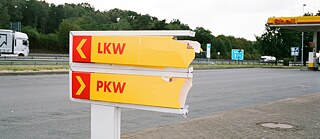Spillages Easy go

Drums with leaked contents, escaped pigs, slimy messes: goods transport accidents, known as spillages, frequently have surprising consequences. Join us out on the road and discover a few of the most revolting, amusing and surprising accidents that have happened during the transportation of goods around the world.
By far the largest proportion of freight transport is still done by road: the Federal Motor Transport Authority KBA counted around three billion tonnes of goods in 2022 on behalf of the Federal Statistics Office in Germany, from lettuces, vests and car tyres to tinned herrings and aluminium knobs. Even though long-distance goods haulage is considered safer in principle than passenger transport – where there is a tendency for speeding – this sector is not completely mishap-free either: freight transport represented around 31,000 accidents with material damage in Germany in 2020, around one-third of which (9,383 involving injury and material damage, 3,113 material damage only) was accounted for by motorway traffic.And yet the consequences of most of these incidents are not of broader relevance. Sometimes they are though, and that’s low-hanging fruit for social media if there are spectacular scenes. Here, in no particular order of importance, are the international favourites of our editorial team:
Twelve tonnes of chocolate in Poland
The cause is unclear, but one beautiful spring morning in 2007, a tanker full of liquid chocolate tipped over on a Polish motorway. The fact that the chocolate was setting on the carriageway turned out to be a problem. Because of that, it took all day to clean it up, and they needed to use large quantities of hot water to melt the sticky substance again.

19 pigs in Japan
This scenario should be representative of all the animals who have managed to escape in similar circumstances, at least temporarily. In a rear-end shunt in 2017 in Japan, a cage holding animals on the way to the abattoir was so severely damaged that 19 of 37 pigs managed to flee. The clever animals made the best of their good fortune and enjoyed a relaxed stroll along the now-closed highway.

White paint in Canada
One Tuesday morning in September 2023, a tanker full of white paint lost its load in Montréal, Canada, as a consequence of sudden braking. It wouldn’t have even been that bad, but on the busy urban expressway during the morning rush-hour no one could be bothered to stop, which meant that the paint was then spread several kilometres along the carriageway by the cars behind.
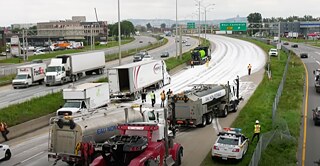
Celery in Canada
One thing many of the accidents involving shed loads have in common is the absence of understanding with regard to their causes. This delightful example of a lorryload of celery emptying completely is no exception. How the driver managed to fully overturn the truck together with trailer in October 2023 in the Canadian town of Aurora, just north of Toronto, in perfect weather on a dead-straight road, could not be established, which is probably the best thing for all involved.
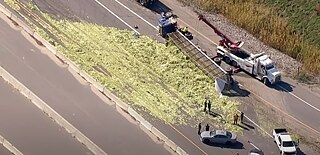
Bricks in India
Heavy rainfall can result in significant structural changes to roads not made of tarmac. The driver of a lorry carrying bricks in the Indian state of Uttar Pradesh in March 2015 failed to consider this advice: the vehicle was listing so severely that the cargo door sustained damage and discharged the heavy load into the environment. It must have literally been a weighty problem to solve – especially in the prevailing climate conditions.
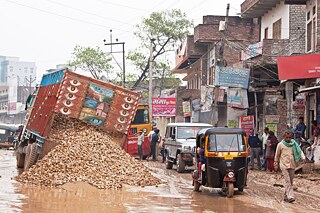
Lego bricks in West Virginia
Good fortune for children (and other fans of the Danish building blocks) on Highway I-79 in West Virginia, USA: a transporter had lost its entire load of Lego, which became a real skid hazard in the damp, wet weather. The highway had to be closed down to one lane, a clean-up crew had the pleasurable task of gathering up the little blocks again. I wonder if they were allowed to take them home?
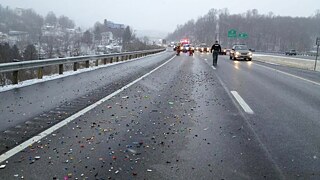
Atlantic hagfish in Oregon
This mishap is a highlight of our collection. Not just because of its particularly revolting nature, but also because of the fact that the main victims were completely unconnected. In July 2017 a transporter on Highway 101 in Oregon braked sharply, causing one of 13 crates of hagfish to slide off the flat loading bed, be flung across the carriageway and collide with an entirely unrelated car. The unusual thing about hagfish is their defence mechanism: when they encounter danger they excrete a concentrated slime, which expands by a factor of 10,000 on contact with water and turns into a sticky mass that clogs the gills of their natural enemies. Catapulted onto a strange car like that, of course the eels were sufficiently stressed and to the detriment of the vehicle occupants began to slime away unabated. Admittedly the casualties included the creatures, of whom the majority perished in the crash.
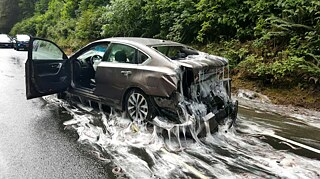
Tomatoes in California
In August 2022, the loss of a load of tomatoes led to a full closure of the Interstate 80 highway in California. A fully-laden big-rig truck – once again for unknown reasons – struck several vehicles and then crashed into the central reservation of the wide road, causing 150,000 tomatoes to be scattered across the lanes, where they either burst instantly or were squashed by other vehicles. A layer of fruit pulp and skin 50 centimetres thick covered a stretch of road around 70 metres long, creating an extremely slippery coating. It became impossible to drive on the carriageway section, which had to be closed immediately.
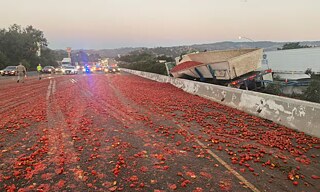
However the question still remained open as to who would be liable for the delay and the damage or loss of the goods. There are clear protocols for this in regular freight transport in Germany (and internationally as well): the transport risk, as it’s known, passes to the buyer as soon as the goods are collected by the carrier. The seller is only responsible if for instance there is evidence of packaging errors. In the event of accidents caused by carelessness or gross negligence however, the buyer can hold the transport company liable. Because of this it’s a good idea to have cargo insurance, which is mandatory anyway for vehicles weighing over 3.5 tonnes.
This means we can focus on the inspirational beauty and bizarre character of motorway freight mishaps. So keep your eyes peeled next time you’re travelling: a slippery layer of tomatoes, some hagfish or a piglet might be waiting for you around the next bend!


